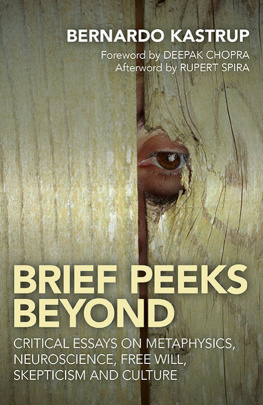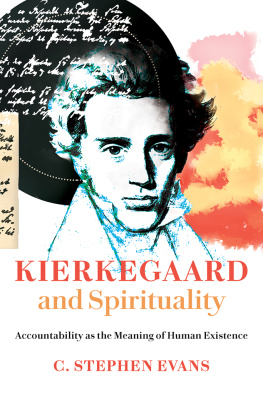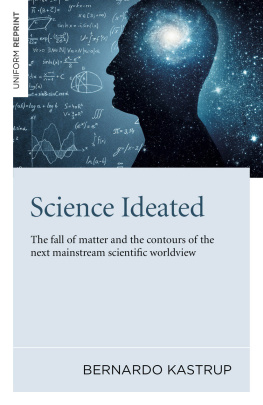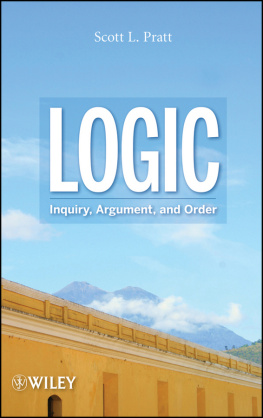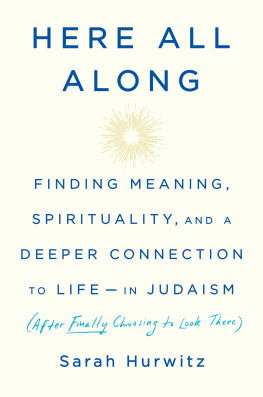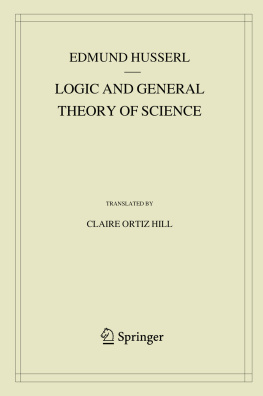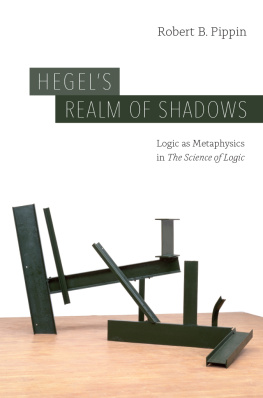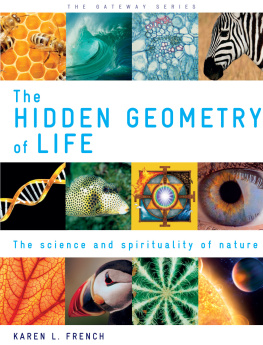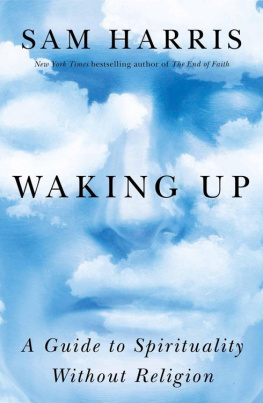First published by O-Books, 2011
O-Books is an imprint of John Hunt Publishing Ltd., Laurel House, Station Approach,
Alresford, Hants, SO24 9JH, UK
office1@o-books.net
www.o-books.com
For distributor details and how to order please visit the Ordering section on our website.
Text copyright Bernardo Kastrup 2009
ISBN: 978 1 84694 407 9
All rights reserved. Except for brief quotations in critical articles or reviews, no part of this book may be reproduced in any manner without prior written permission from the publishers.
The rights of Bernardo Kastrup as author have been asserted in accordance with the Copyright, Designs and Patents Act 1988.
A CIP catalogue record for this book is available from the British Library.
Design: Stuart Davies
Printed in the UK by CPI Antony Rowe
Printed in the USA by Offset Paperback Mfrs, Inc
We operate a distinctive and ethical publishing philosophy in all areas of our business, from our global network of authors to production and worldwide distribution.
To all conscious entities who have already contributed to the
unfinished set of subjective experiences I call my life...
...particularly my wife Natalia.
Chapter 1
The hypothesis of meaning
The intuitive notion of meaning as an ultimate purpose for existence and life is deeply ingrained in the minds of most individuals. Why am I here? we ask ourselves. But a more fundamental question may be whether it makes any sense to ask about meaning in the first place. Nobel-laureate physicist Richard Feynman once said: There are many things I dont know anything about, such as whether it means anything to ask why were here, and what the question might mean.1 Perhaps the very concept of meaning is fallacious; an illusion engendered by our brains, maybe as a consequence of a survival advantage in our evolution as a species.
As this book was being written, Matthew Hurley, Reginald Adams Jr., and Daniel Dennett were working on an evolutionary explanation for, of all things, our sense of humor. Humor seems to be such an abstract feeling, so removed from the framework of survival of the fittest, that any attempt to explain it through evolutionary biology may appear futile. Yet, in a talk, Daniel Dennett has suggested that humor is merely a neural system wired up to reward the brain for doing a grubby clerical job.2 If that is true, then it is not unreasonable that natural selection could have favored the survival of individuals with a more developed sense of humor. The validity of this theory aside, the fact is that serious and respected philosophers can rationally argue that some of the most abstract of our feelings and motivations actually may have had very practical, survival-oriented applications during our evolutionary history. This alone should make us treat the question of meaning with caution.
Even if meaning is not merely an illusion, even if it truly exists in nature and it is a valid line of rational inquiry to search for it, there is no guarantee that we are intellectually equipped to grasp it. Logically, it is a possibility that the limitations of our own perception and comprehension may inherently prevent us from ever understanding the ultimate purpose of existence. In this case, as far as we are concerned, searching for meaning would be as futile as if the concept of meaning itself were fallacious.
Since you are reading this book, it is relatively safe to assume that you feel an intuitive and strong drive for the search of meaning, or ultimate purpose, in your life. Nonetheless, the two scenarios described above may make you feel insecure about the validity of your own motivations. I wish I could give you sound logical arguments right here to convince you that meaning must be real, and that it must be within the scope of our comprehension to grasp it. However, I cannot. What I can tell you is this: having meditated intensely on this for many years, from both sides of the argument, I have intuitively concluded, to my own satisfaction, that there is indeed meaning to existence.
So my invitation to you is this: assume, as starting hypotheses, that there is indeed a meaning for existence and that it can be at least partially understood; what might that meaning then actually be? This book tries to sketch a rational answer to this question. Notice that I am not asking you to believe in these hypotheses blindly, but simply to keep an open mind about the possibility of their being true, so that we can pursue certain avenues of rational exploration. Then, after having read this book, you will be able to consider the answers we will arrive at and judge whether they make sense. Informed by that judgment, you will be able to look back and reconsider whether the concept of meaning is real or merely an illusion concocted by our brains.
Chapter 2
A search for ultimate purpose
What happens but once [] might as well not have happened at all. If we have only one life to live, we might as well not have lived at all.1 So does world-renowned author Milan Kundera capture the apparent futility of existence and its ephemeral character. If, as indicated by the second law of thermodynamics, all dynamic and organized structures in the universe, amongst which galaxies, stars, and living creatures like you and me, will eventually expire without a trace, existence appears devoid of meaning. From the point of view of orthodox materialistic science, all choices we make and experiences we live throughout our lives will, in time, be of no consequence. As such, our lives are light in their insignificance. Such unbearable lightness of being, captured so powerfully in Kunderas work, is an agonizing and profoundly counter-intuitive perspective for many of us.
As rich and satisfying as our lives may sometimes be, most of us are marked by past or present experiences of profound pain and suffering. Loss, disappointment, frustration, anxiety, regret are or have been familiar concepts to most of us. Is there anything we suffer for? And even when everything seems to go well in our lives, we sometimes cannot help but wonder whether there is any meaning in that either. What can be the meaning of our success, our material wealth, of our fleeting moments of happiness, and even of our most profound rejoicing when, givenenough time, not a trace or even a memory of our existence will be left behind? From a rational perspective, can there be anything thatsurvives our participation in the universe, adding something to its veryessence in a way that transcends time? Without it, there can be no true meaning to the dance of existence.
There are no obvious answers to this question. Yes, our children survive us. The work we carry out during our lives often survives us too, be it through material entities like the buildings of an architect, or more abstract entities like the ideas of a philosopher. But notice, the common thread behind all these tentative answers is the same: whatever outcome of our lives survives us only has meaning through the lives of other people like ourselves. The achievement of meaning is merely postponed in a self-similar way. Your children are people like you. The house built by the architect is only meaningful through the people who will live in it. The ideas and concepts left behind by the philosopher are only meaningful through the people who will read his books. But what, then, is the meaning of the lives of those


